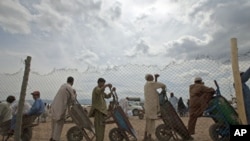International aid agencies say Pakistan’s counter-insurgency operations in a northwestern tribal district have forced thousands of families to flee the region. United Nations officials are warning that the number of internally displaced persons is growing by the day, and they say more funds are needed from international donors to help those affected.
Pakistani security forces have frequently conducted major operations to try and secure the country’s porous western border with Afghanistan, a known hub of Taliban and al-Qaida fighters.
The latest battleground is the Khyber tribal district, which serves as a main trade route and supply line to NATO-led international forces in Afghanistan.
The head of the United Nations refugee agency’s operations in northwestern Pakistan, Ahmed Warsame, said that more than 200,000 people have fled the fighting since January. He said while an estimated 10 percent of the refugees have been accommodated at the Jalozai refugee camp just outside Peshawar, the rest have gone to neighboring towns to stay with family members.
“It’s a huge undertaking for us. Jalozai has increased its size four times as much as it was four weeks ago. We are currently registering some 2,000 families a day, and that has been fairly stable since March 17. Fifty-two to 53 percent of the population is women and children, and also elderly people,” said Warsame.
Pakistani authorities believe the flow of displaced people will continue for another six months. The UNHCR and other international aid agencies warn they will not be able to continue humanitarian assistance without additional financial resources from the international community.
Faris Qaism, a spokesman for Save the Children, said the conflict is severely affecting children.
“What we found is that many of these children are suffering from the psycho-social issues. This means that they are exhibiting behavioral changes - they have loss of appetite, some are scared to even go outside because they have witnessed firings or bombings in their areas," said Qaism.
Pakistan’s nearly decade-long war against home-grown Taliban extremists has triggered suicide bombings and other terrorist attacks around the country, killing thousands of people. The deadly violence, however, has relatively subsided during the past year.
Authorities say that a series of violent militant attacks at the beginning of the year in and around the northwestern city of Peshawar, which borders the Khyber tribal region, has prompted the ongoing offensive. A turf war between extremist groups in Khyber also is being blamed for the exodus of displaced people.












